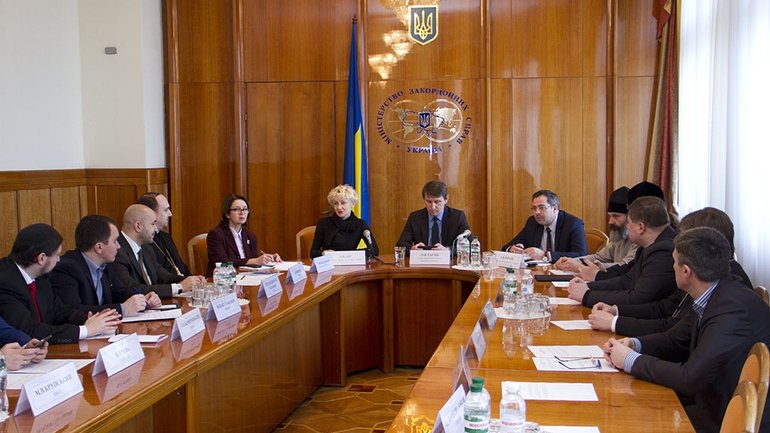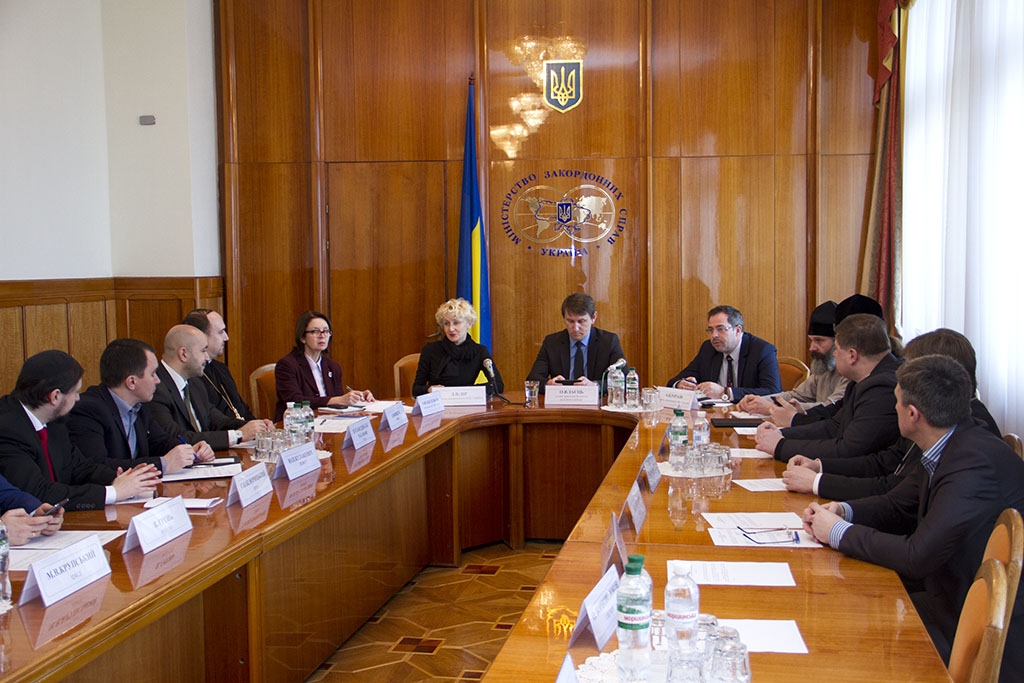Ukraine’s Ministry of Foreign Affairs discussed manifestations of religious intolerance towards Ukrainian citizens in Crimea and Donbas

During the meeting chairman of the Institute for Religious Freedom Oleksandr Zayets, representative of the Ukrainian Christian Evangelical Church Lukyanov and ruling bishop of the Crimean Diocese of the Ukrainian Orthodox Church-Kyiv Patriarchate, Archbishop of Simferopol and Crimea Klyment publicized the facts of manifestation of religious intolerance towards Ukrainian citizens who remained in the temporarily occupied territory of the Autonomous Republic of Crimea and in some territories of Donetsk and Luhansk regions. According to the press service of the Foreign Ministry of Ukraine, Council members exchanged views on measures to protect believers of different faiths in the temporarily occupied territory of Ukraine and stressed in their speeches that there was no harassment on religious grounds in Ukraine, and the respective charges on the part of the aggressor are aimed to distract the international attention from flagrant violations of human rights in the temporarily occupied territories of Ukraine and in the Russian Federation itself. The meeting participants noted the importance of participation of churches and religious organizations in international events, among them - participation of Chief Rabbi of Kyiv and Ukraine Jacob Bleich in the activities within the state visit of the President of Ukraine to the State of Israel, representatives of the Ukrainian denominations in the opening of the Memorial to the victims of Holodomor 1932-1933 in Ukraine held in Washington DC (USA) on November 8-9, 2015, as well as the participation of Christian Evangelical Church in cooperation with the Ukrainian community in providing humanitarian aid to Ukraine. As RISU has already reported, in Ukraine-controlled areas of Donbas there are no religious conflicts, while only the UOC (MP) is tolerated in the occupied territories. The temporarily occupied areas of Donbas adopted their own "constitution", which envisages the operation of only one Orthodox Church of the Moscow Patriarchate. RISU repeatedly reported the facts of persecution of Protestants and Orthodox of the Kyiv Patriarchate in Donetsk and Luhansk, currently controlled by pro-Russian militants. Human rights activists have gathered facts of religious persecution in the occupied Donbas. The report entitled “When God becomes a weapon” includes facts, testimonies of witnesses and victims of religiously motivated persecution, carried out by separatist militants during the armed conflict in eastern Ukraine. Last week the militants of DPR kidnapped religious historian Igor Kozlovsky under pretext of “improper correspondence” in social networks. He is being kept in the basement. A protest action was held in Donetsk on January 29. The protesters said they oppose sectarians, the Ukrainian Catholic Church, which, in their view, opposed the idea of forcing people to unity with Ukraine. Many people at the rally handed out prepared posters. In Crimea, the only one priest of the Ukrainian Greek Catholic Church remains working on a regular basis. Others have the right to worship in the peninsula only on a rotational basis in the presence of migration cards. This is reported in the article by Jana Stepankovska "How Ukrainian churches manage to remain Ukrainian in Crimea" for QirimInfo. After the annexation of Crimea by Russia in 2014, Crimean Tatars started to disappear from the peninsula. The Office of Russian Investigative Committee in Crimea instituted a criminal case, but the places of residence of these people are still unknown. The cases were instituted on charges of theft or murder. In the summer of 2015, residents of Simferopol district - Memet Selimov born in 1986 and Osman Ibragimov born in 1988 disappeared from the peninsula. On August 29, 2015, their bodies with signs of violent death were discovered in the courtyard of a house in Simferopol district. Law enforcement officers arrested a 31-year-old man on charges of murder. According to preliminary information, a household crime was committed, the police said. In Simferopol, on January 28, the armed Russian security forces surrounded the mosque of the Islamic Cultural Center, located on Mokrousov street 7, and made a search. Even Muslims who came to pray, were not let in. Typically they plant the books in the mosque that are considered prohibited in Russia, and institute the administrative proceedings on this ground. So imams had to carefully check every corner, every shelf in the mosque daily so that no one planted these books. The UOC-KP suffers from persecutions in Crimea. Russian “arbitral tribunal” in Crimea recently decided to seize premises of the Crimean Diocese of the Ukrainian Orthodox Church that it rightfully owns. This is the premises of the Cathedral of St. Vladimir and Olga in the center of Simferopol. On February 3, 2016, the Public Council for Cooperation with Religious Organizations to the Ministry of Foreign Affairs of Ukraine held its VI session.
On February 3, 2016, the Public Council for Cooperation with Religious Organizations to the Ministry of Foreign Affairs of Ukraine held its VI session.









